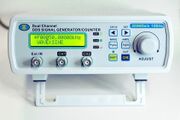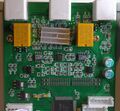Difference between revisions of "MHINSTEK MHS-5200A"
m (→Connection: add other vid/pid info) |
m (→Photos: add ch340 photo) |
||
| Line 42: | Line 42: | ||
MHINSTEK MHS-5200A analog.jpg|<small>PCB, analog circuitry</small> | MHINSTEK MHS-5200A analog.jpg|<small>PCB, analog circuitry</small> | ||
MHINSTEK MHS-5200A back.jpg|<small>PCB, bottom</small> | MHINSTEK MHS-5200A back.jpg|<small>PCB, bottom</small> | ||
MHINSTEK MHS-5200A CH340.jpg|<small>2015 version PCB, with CH340</small> | |||
</gallery> | </gallery> | ||
Revision as of 07:58, 31 August 2018
 | |
| Status | planned |
|---|---|
| Frequency (user) | 0.01Hz-6MHz/12MHz/20MHz/25Hz |
| Waveforms | sine/square/triangle/sawtooth/arbitrary, TTL rect |
| Amplitude | 20 V (open)/10 V (50 Ohm) (adjustable) |
| Connectivity | USB/serial |
| Website | mhinstek.com |
The MHINSTEK MHS-5200A (-06M/12M/20M/25M) is a dual-channel, standalone function generator. It can be controlled with the push-buttons and the rotary encoder on the front panel, or via a USB interface.
Amplitude and offset voltage can be controlled programmatically.
Device also supports different measurements via 'Ext. In' or 'TTL' channels. It can measure: frequency, counter, pulse width, period and duty cycle.
Hardware (Q3 2016 model)
- FPGA: Lattice MACH XO2 1200HC TQFP-100
- Clock: unknown
- STM8S005K6 8-bit MCU with 32 Kbytes Flash, 16 MHz CPU, integrated 128 byte EEPROM STM8S005K6 product page
- Output stage:
- R2R-ladder 12bit DAC
- Signal/DC-offset sum: AD8017 Op-Amp
- Variable gain amplifier: AD603A
- Power amplifier: AD812A
- Output switch relais: 0db/-20db/off
- 24LC512 I²C EEPROM, 512Kb (64K x 8) for arbitrary waveform data
- 74AHC14D hex inverting schmitt trigger
According to the specs, the hardware should run at 200MS/s, but measurement shows it only runs at ~175MS/s.
Photos
Connection
The generator has an internal PL2303 USB-to-serial converter. The VID/PID is 067b:2303. Communication parameters are 57600 bps, 8N1.
The earlier 2015 version (firmware 4.22) has CH340 chip for USB-to serial converter, so the VID/PID is 1a86:7523, while rest of the components and functions remain unchanged.
Protocol
The generator uses a plain text protocol for communication.
Each command (set or read) starts with ':' and has to be terminated with a newline, ASCII code 0x0a (but CRLF, i.e. 0x0d 0x0a, is also accepted).
Set commands are acknowledged with an 'ok' response, read commands echo the request followed by the parameter value.





